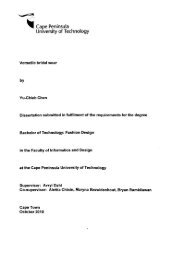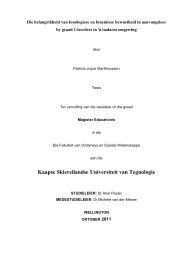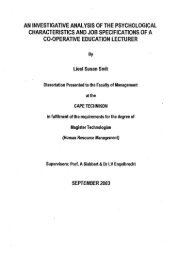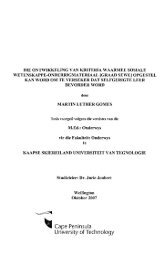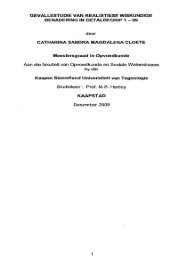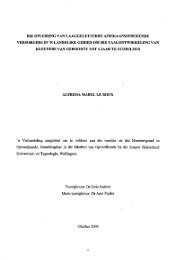E-commerce - Cape Peninsula University of Technology
E-commerce - Cape Peninsula University of Technology
E-commerce - Cape Peninsula University of Technology
You also want an ePaper? Increase the reach of your titles
YUMPU automatically turns print PDFs into web optimized ePapers that Google loves.
Chapter 2: Literature review Page 16<br />
deliver anywhere, and provide online tracking facilities for checking how far a<br />
parcel has gone (The Economist, 2004). Indeed, dot-com upstarts such as<br />
Netgrocer, Peapod and Webvan, all <strong>of</strong> which delivered goods ordered on the<br />
Intemet to e-eustomers' doors aimed to put a serious hurt on their traditional<br />
shop counterparts, not to work with them (Buderi, 2005).<br />
All over the world, individuals have begun businesses this way. They might<br />
be selling avatars (virtual personas for onJine gaming) in South Korea, tribal<br />
carvings in South Africa, model steam-engine parts in Germany, or classic<br />
Corvettes in Califomia. Web publishing too can now more easily be<br />
supported by advertising. Some e-<strong>commerce</strong> companies will find and place<br />
ads on their website for individuals or companies, and split the revenue.<br />
Google's AdSense service, for instance, uses the search engine's technology<br />
automatically to match the content <strong>of</strong> a website with appropriate text-based<br />
ads. In other moves, Google has been steadily expanding its operations<br />
beyond its core Intemet search sites, to include free e-mail, web logs and<br />
online comparison shopping. The Economist believes that the more popular<br />
a site becomes, the higher the income (The Economist, 2004).<br />
Now, a different approach to supermarket e-<strong>commerce</strong> is emerging. E<br />
retailers start to gather information from the moment the customer accesses<br />
the site until the moment the customer exists, regardless <strong>of</strong> whether the<br />
customer makes a purchase or not. The e-retailer now begins to leam about<br />
each customer. This information forms a basis for initiating a dialogue with<br />
the customer in the future and starts to build a customer relationship. They<br />
also use this data to target advertising and promotions, treating<br />
demographically identical neighbours differently. Customers will no longer be<br />
treated as segments but as unique individuals. The objective <strong>of</strong> the e<br />
retailers is to convert browsers into loyal customers. This is evident in<br />
Peapod.com, an e-retail supermarket and Tesco (Walsh & Godfrey, 2000).




